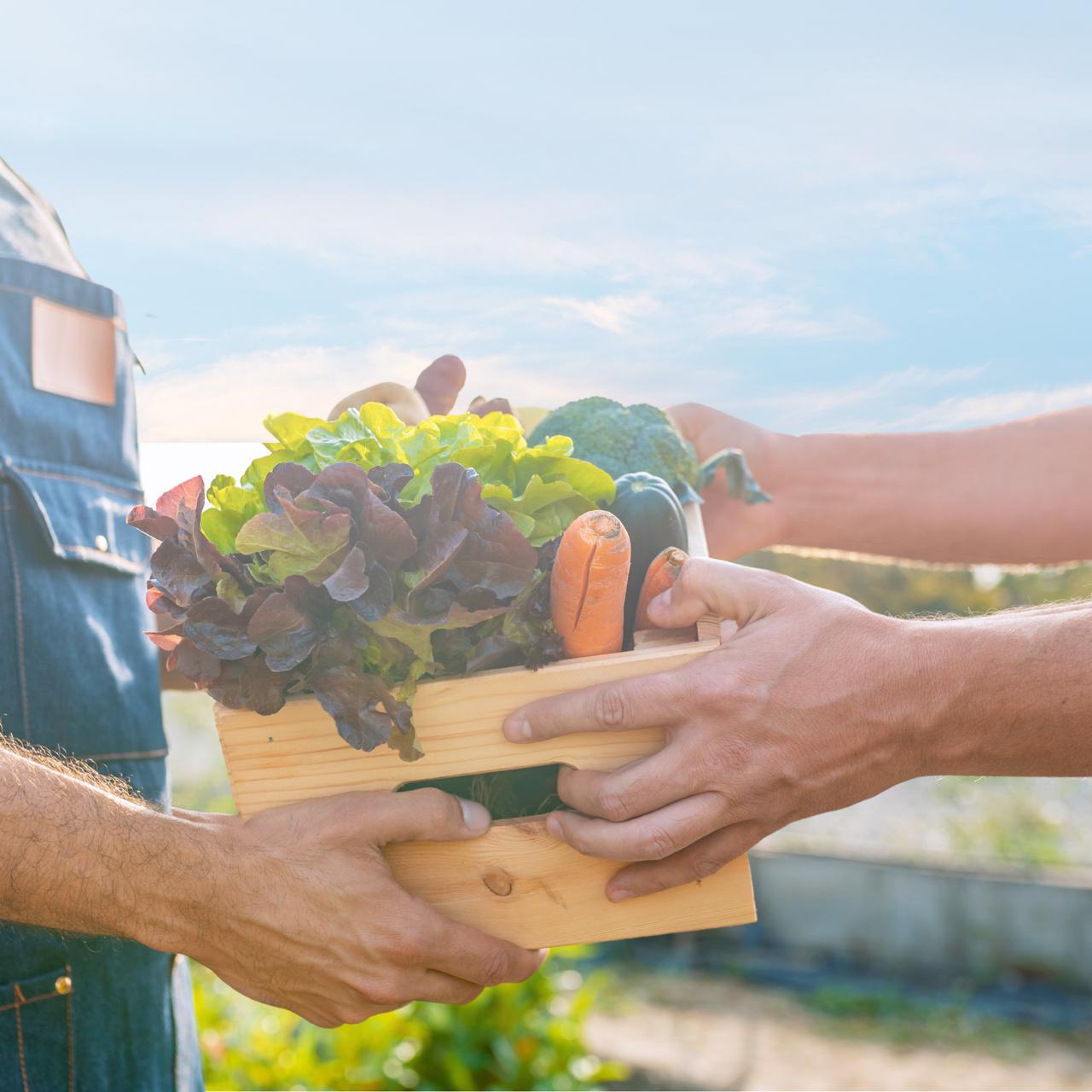
By: Grace Feisthamel
Edited by: Muhammad Hani Ahsan and Katherine Farrell
Graphic by: Ava Lagressa and Arsh Naseer
Farm Fresh Rhode Island
Farm Fresh Rhode Island, a nonprofit food hub operating out of Providence, Rhode Island, works to connect local farmers and producers to consumers with an emphasis on increasing food access using federal benefit programs. Through a multiplicity of programs, the organization addresses the issue of food insecurity by enabling farmers to sell their products and giving customers choices in their access to food. Food security refers to environments in which “all people at all times have physical and economic access to sufficient, safe and nutritious foods”.1 Food security continues to be a long-recognized metric of nutrition, chronic disease, and absenteeism in work and school environments. A vital piece of promoting food access includes access to culturally relevant food, adding a layer of consumer autonomy.
Market Mobile is a program that operates an e-commerce distribution system where customers and institutions place orders twice weekly for delivery or pickup at the [FFRI’s] headquarters. Market Mobile communicates these orders to local farmers and producers, who then drop off their products before the delivery/pick-up window. The program is primarily offered to larger institutions, such as the Rhode Island School of Design, Boston University, the Newport Restaurant Group, local K-12 schools, or individual customers, such as families, cooperative style groups, or individuals.2 In 2019, the program had been growing steadily, and hospitals in the Providence area had just agreed to start ordering regularly through the platform. To staff, 2019 was a turning point, as prospective institutional customers were beginning to approach Market Mobile. Previously, Market Mobile operated by advertising services within the local network in hopes of reaching new customers, and drafting informal, non-contractual agreements.3 With consistent customers, wholesale orders operated under a “standing order” system, meaning that Market Mobile assumed that these customers placed the same order weekly and would communicate as such to farmers and producers. This kind of program utilizes “value-based institutional food service” which is a common offering in food systems today.4 The industry is very large – restaurants, caterers, and cafeterias are responsible for the majority of food consumption outside of the home. Therefore, this industry can be impactful in supporting farmer livelihoods, as its revenue totals about $200 billion annually.5
Another program at Farm Fresh RI, the Food Access program, works to directly staff, coordinate, and manage farmers markets. FFRI also supports a nutrition incentive program, Bonus Bucks, which offers a 100% match incentive on any Electronic Benefit Transfer (EBT) purchase at local outlets. This program is offered at seven farmers markets that Farm Fresh manages directly, non-FFRI farmers markets that operate across the state of Rhode Island, CSAs (Community Supported Agriculture), farm stands, Market Mobile, and other pop-up locations. Funded by a large-scale United States Department of Agriculture (USDA) grant, the Bonus Bucks program allows users to spend the match on fresh fruits, vegetables, and herbs. At food access outlets, Bonus Bucks take the form of a scrip program, or physical tokens that customers can spend with vendors. At Market Mobile and other delivery routes, the program is structured as a discount for ease of program administration.
Food Insecurity in Rhode Island
According to an annual report created by the Rhode Island Community Food Bank and Brown University, around 9% of Rhode Island households were food insecure in 2019.6 Food security in Rhode Island is championed by a tight-knit network of community-based organizations, including (1) a surprising number of farmers and producers given the geographic limitations of the state, (2) many restaurant entrepreneurs, and (3) non-profit organizations, as Rhode Island has one of the highest numbers of tax-exempt organizations per capita.7
Farm Fresh RI’s Response to the Pandemic
At the start of the pandemic, supermarkets and other brick-and-mortar stores operated at limited capacity. Employees at FFRI working to administer programs were regarded as essential workers and programs pivoted quickly to respond to a demand for locally sourced food. Market Mobile expanded orders from individual customers as institutional customers canceled their standing orders. This decision proved timely and instrumental in supporting farmers and increasing food access. While this switch was administratively difficult – the organization lacked the resources required to operate at an increased capacity in the short run – FFRI preserved sales for farmers and producers and supported food-insecure Rhode Islanders. Farmers markets and other food access outlets quickly began operating outside with vendors distanced between tables. Staff worked to manage customer counts and occupancy following CDC guidelines. Despite technological gaps, Market Mobile worked to accept EBT payments for online orders. Until 2019, Supplemental Nutrition Assistance Program (SNAP) purchases on EBT cards could only be completed in person due to policy and technological limits. The USDA implemented the Online Purchasing Pilot to allow three online retailers in select states to accept online EBT payments.8 The Pilot proved to be successful and although it expanded to cover more states around the country, it was, and continues to be, a very exclusive program.9 Complicated bureaucratic processes have meant that retailers such as Amazon and Walmart have dominated the pilot program. Market Mobile has had to create extraneous steps to support customers paying with EBT cards.
Figure 1. Market Mobile Payment Types by Month10
Note. The figure shows the growth of Market Mobile orders from March 2020 through September 2023. Orders are represented by payment types, as noted in the legend. This figure was created through sales data collected from Farm Fresh Rhode Island.
The RI Community Food Bank’s Status on Food Hunger for 2020 reported that one in four Rhode Island households lacked adequate food, encompassing 25% of households in the state, the highest level of food insecurity recorded in 20 years.11 As the rate of food insecurity was declining from 14.7% in 2018 to 9.1% in 2019, this trend was drastically and dangerously reversed. Food insecurity disproportionately impacts households of color as 21% of White households reported experiencing food insecurity, in comparison to 36% and 40% of Black and Latinx households, respectively.12
Policy Response
There were multiple policy responses to this at the federal and state levels. At the federal level, the Coronavirus Aid, Relief, and Economic Security (CARES) Act was passed in March 2020. The CARES Act was a $2.2 trillion economic stimulus bill which meant that unemployed Rhode Islanders could receive $600 each week as part of insurance compensation.13 Recipients of [SNAP] also received the maximum amount of benefits each month, estimated to be equivalent to $646 for a family of four. This, in turn, allowed SNAP benefits in Rhode Island to rise by around 35%.14 As schools remained closed across the country, low-income students were not able to receive free or reduced breakfasts and lunches. In response, all Rhode Island students were offered free meals which could be picked up at school locations. Additionally, the USDA began the “Pandemic-Electronic Benefit Transfer”, or P-EBT, program. Families of students who normally received meals at school were given [EBT] cards with added benefits to purchase food.15
At Farm Fresh RI, customers could pay for Market Mobile and farmers market purchases with their P-EBT cards. They also received increased purchasing power through the Bonus Bucks program. At farmers markets and Market Mobile, sales increased exponentially with added [EBT] and new P-EBT funding.
Figure 2. Farmers Market Sales by Year16
Note. The figure shows the growth of sales at farmers markets from 2018 through 2023, depicted by payment type and farmers market season. While there are eight summer farmers markets, there is only one wintertime market. This figure was created through analyzed sales data collected by Farm Fresh Rhode Island.
In addition to increased funding through the CARES Act, the Federal Nutritional Service (FNS) office of the [USDA] also provided adaptations to the SNAP program at the state level. This included approval for states to issue emergency supplements to SNAP households, expanding support for the [SNAP] Online Purchasing Pilot, and others.17
Today’s Policy Landscape
Today, about 77,500 Rhode Islanders seek food assistance each month, which is 30% more than one year ago and 49% more than before the pandemic.18 After spiking in the second half of 2019 and the beginning of 2021, the food insecurity rate was buffered by a major increase in federal nutrition programs. Data shows that there has been a rise in food insecurity in 2022 and 2023 as most pandemic-era policy programs have ended. According to the RI Community Food Bank, the rate of food insecurity increased in 2022 to 31% of Rhode Island households and now sits at around 29% of households.19 As funding for the CARES Act ran out in late 2022, these innovative policy practices have ended. These programs include School Meals for All, the Enhanced Child Tax Credit, the Pandemic Electronic Benefit Transfer (P-EBT) for Families with Children, Extra WIC Benefits, and Emergency SNAP Benefits.20
As food inflation rose, food costs in Rhode Island increased by 13% between 2021 and 2022. Food disparities persist despite all food outlets opening as they were pre-pandemic.21 To this day, Market Mobile is still unable to accept [EBT] payments online. Local representatives introduced the ‘Healthy School Meals for All’ program, which would create a state program providing all students free breakfasts and lunches each day.22 However, this only passed in the state Senate and was struck down in the House of Representatives.
Policy Recommendations
The novel COVID-19 pandemic allowed innovative policy solutions addressing food insecurity issues to be implemented swiftly. Through this experience, the following policy recommendations have become clear:
- Significant administrative barriers stand in the way of food-insecure individuals applying for federal benefit programs. This may include accessibility due to English language barriers, lack of access to technology to complete online applications, lack of accessibility in traveling to local DHS offices, and general slow-moving bureaucracy at the state level that limits individuals from receiving benefits on time. During the pandemic, local [DHS] offices switched to allowing prospective and current recipients of federal assistance programs to access applications and forms online. In addition to maintaining this function, an analysis of the accessibility of these programs is strongly recommended.
- Increase [SNAP] benefits per household. Data shows that 70% of Rhode Islanders receiving [SNAP] benefits exhaust their benefits in just two weeks. This is up from 49% in 2019.23
- Expand the Online Purchasing Pilot, which is currently bottlenecked at the [USDA]. Access to online purchasing would allow consumers to have greater access to food, including those in rural populations who may receive [SNAP] benefits. Due to limited financial resources, technological hurdles, and a difficult application process that requires approval of each store in each state, the program has not been accessible to grocery stores beyond Amazon and Walmart.24
- Continue a federally-funded school meal program.
Food security in Rhode Island was strengthened between 2020 and 2022 as a result of innovative and collaborative policy and program solutions created and administered by a tight network of stakeholders in the local food system. In recent years, community-based nonprofit organizations have played large roles in developing innovative practices to address gaps in social services, and in the context of civic participation and social engagement.25 Oftentimes acting as liaisons between state or federal agencies and constituents, nonprofits are known to address gaps in services that governmental entities fail to address. As such, constituents build more trust in these organizations than the governments that represent them.26 This public health crisis has revealed major gaps in services through federal programs, as crises often do, and serves as an opportunity for policymakers to reinvigorate pandemic-era policy to better support constituents.27 In instances of crisis, emergency food assistance must be provided in the short term. As a result of the COVID-19 crisis, food security must be promoted in the long term. [FFRI’s] work is twofold; Rhode Island eaters are supported in having increased food access while farmers and producers are also supported in their food businesses by having increased connections to consumers. The solution is cyclical; the local food economy is strengthened and the system is made more robust.
Reference
[1] Rhode Island Food Policy Council. n.d. “DATA DASHBOARD Food Access and Security.” Rhode Island Food Policy Council. Accessed April 15, 2024. https://rifoodcouncil.org/data-dashboard/food-access-and-security/.
[2] Van Scyoc, Rachel. 2023. “Interview with” Feisthamel, Grace. October 20, 2023.
[3] ibid
[4] Campbell, Catherine. 2023. “Values-Based Institutional Food Procurement Programs: A Narrative Review.” The Journal of Agriculture, Food Systems, and Community Development, August 21, 1-11. https://doi.org/10.5304/jafscd.2023.124.005.
[5] ibid
[6] Rhode Island Community Food Bank. n.d. “2020 STATUS REPORT on Hunger in Rhode Island.” Rhode Island Community Food Bank. Accessed April 15, 2024. https://upriseri.com/wp-content/uploads/2020/11/2020-RICFB-StatusReport-FINAL-web.pdf.
[7] Greenberg, Scott. 2015. “Which States Have the Most Tax-Exempt Organizations?” Tax Foundation. https://taxfoundation.org/data/all/state/which-states-have-most-tax-exempt-organizations/.
[8] Healthy Eating Research. 2021. “Promoting Equitable Expansion of the SNAP Online Purchasing Pilot.” Healthy Eating Research. https://healthyeatingresearch.org/wp-content/uploads/2021/07/HER-Online-Purchasing-Brief-FINAL.pdf.
[9] ibid
[10] Rhode Island Community Food Bank. n.d. “2020 STATUS REPORT on Hunger in Rhode Island.” Rhode Island Community Food Bank. Accessed April 15, 2024. https://upriseri.com/wp-content/uploads/2020/11/2020-RICFB-StatusReport-FINAL-web.pdf.
[11] ibid
[12] ibid
[13] ibid
[14] ibid
[15] ibid
[16] Jones, Taylor. 2023. “Interview with” Feisthamel, Grace. October 20, 2023.
[17] Food and Nutrition Service U.S. Department of Agriculture. 2023. “State Guidance on Pandemic EBT | Food and Nutrition Service.” USDA Food and Nutrition Service. https://www.fns.usda.gov/snap/state-guidance-coronavirus-pandemic-ebt-pebt.
[18] Rogers, Michelle L., Tamara A. Sequeira, and Melissa A. Clark. 2023. “2023 Rhode Island Hunger Survey.” Rhode Island Community Food Bank and Brown University School of Public Health Survey Research Center. https://rifoodbank.org/wp-content/uploads/2023/10/2023-Rhode-Island-Hunger-Survey_Full.pdf.
[19] Russo, Amy. 2023. “More RI families are going hungry. Will free school meals make a comeback next session?” The Providence Journal. https://www.providencejournal.com/story/news/local/2023/08/30/food-insecurity-is-way-up-in-in-rhode-island-are-free-school-meals-the-answer/70657004007/.
[20] Rogers, Michelle L., Tamara A. Sequeira, and Melissa A. Clark. 2023. “2023 Rhode Island Hunger Survey.” Rhode Island Community Food Bank and Brown University School of Public Health Survey Research Center. https://rifoodbank.org/wp-content/uploads/2023/10/2023-Rhode-Island-Hunger-Survey_Full.pdf.
[21] Baccari, Raymond. 2022. “Food Bank releases 2022 status report on hunger in Rhode Island.” PROVIDENCE NOW. https://www.abc6.com/food-bank-releases-2022-status-report-on-hunger-in-rhode-island/.
[22] Russo, Amy. 2023. “More RI families are going hungry. Will free school meals make a comeback next session?” The Providence Journal. https://www.providencejournal.com/story/news/local/2023/08/30/food-insecurity-is-way-up-in-in-rhode-island-are-free-school-meals-the-answer/70657004007/.
[23] Rogers, Michelle L., Tamara A. Sequeira, and Melissa A. Clark. 2023. “2023 Rhode Island Hunger Survey.” Rhode Island Community Food Bank and Brown University School of Public Health Survey Research Center. https://rifoodbank.org/wp-content/uploads/2023/10/2023-Rhode-Island-Hunger-Survey_Full.pdf.
[24] Healthy Eating Research. 2021. “Promoting Equitable Expansion of the SNAP Online Purchasing Pilot.” Healthy Eating Research. https://healthyeatingresearch.org/wp-content/uploads/2021/07/HER-Online-Purchasing-Brief-FINAL.pdf.
[25] Anheier, Helmut K., and Stefan Toepler. 2019. “Policy Neglect: The True Challenge to the Nonprofit Sector.” Nonprofit Policy Forum 10, no. 4 (November 21): https://doi.org/10.1515/npf-2019-0041.
[26] ibid
[27] Kettl, Donald F., and James W. Fesler. 2008. The Politics of the Administrative Process. N.p.: SAGE Publications.






Leave a Reply